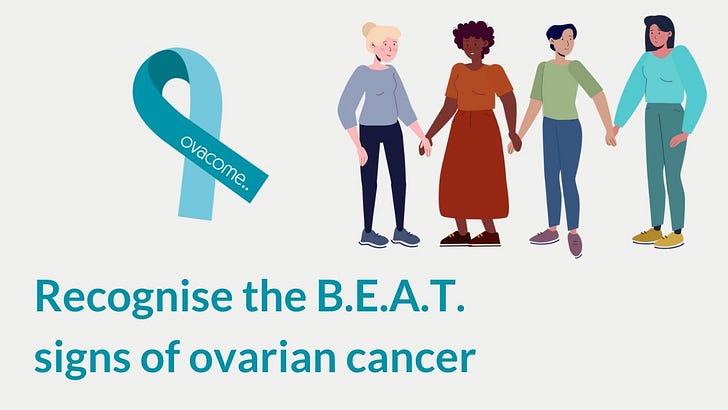Ovarian Cancer: everything you need to know
A closer look at what it is, how you can reduce your risk and what you need to look out for. Let's get informed!
For those of you new here - hello! - this newsletter takes a deeper look at a health condition affecting women which you need to know about. And when I say “need to know”, I mean: what you need to look out for, how you can reduce your risk of getting it, what it actually is. There is SO MUCH information on the internet now, the useful stuff can get really lost, which is where Women’s Health Happens comes in. Think of this as you one-stop-shop to everything you need to know about certain health conditions. And this week its the turn of… Ovarian Cancer.
What is it?
Over 7,000 people in the UK are diagnosed every year with ovarian cancer which is a type of gynaecological cancer i.e. a cancer that starts in a woman’s reproductive system (there are 5 gynaecological cancers: cervical, ovarian, womb, vaginal and vulval cancers). To get back to basics, it’s when abnormal cells in the ovary begin to grow and divide in an uncontrolled way and eventually form a growth or tumour.
What do I need to look out for?
Ovarian cancer is uncommon, but if you were banking on your smear test (technical term: cervical screening test) to identify it, then don't - the smear will not detect ovarian cancer. The problem with this cancer is that many people may have had symptoms for months but dismissed them as digestive problems or signs of the menopause (gah!) or generally getting older and a bit more knackered.
As we all know, early diagnosis is vital to improving outcomes, and BEAT is a brilliant campaign by Ovacome (a charity who provide a huge amount of information about Ovarian Cancer-details below) to help identify key symptoms:
B is for bloating that doesn’t come and go
E is for eating difficulty and feeling full more quickly
A is for abdominal and pelvic pain you feel most days
T is for toilet changes in urination or bowel habits
these aren’t the only symptoms, so if you’re worried about any changes or anything that’s not “normal” for you, then see your GP.
What increases my risk in getting it?
There are various factors which can increase your risk of getting ovarian cancer, so if any of these apply it's best to be more vigilant when looking for symptoms.
Getting older… we can't stop it! And as a friend of mine always says, its better to be getting older than not. The risk of ovarian cancer increases significantly from around 45 years and is greatest in those aged between 75 and 79 years.
Inherited genes. About 5-15% of ovarian cancers are caused by inherited faulty genes including faulty versions of BRCA1 and BRCA2. As with all this advice, if you are worried about your family history of ovarian (or other) cancer, speak to your GP and they can advise you whether you might benefit from a referral to a genetics service.
Smoking…the longer you've smoked, the greater the risk.
Some medical conditions such as endometriosis or diabetes (potentially higher in those that use insulin).
Being overweight or obese… its the excess body fat which is linked to an increased risk.
Using hormone replacement therapy (HRT) after the menopause - in the UK 4% of ovarian cancers are linked to HRT use. However, please speak to your GP about any concerns you've got with HRT - the increase in risk is small, and HRT can be hugely helpful for women with menopausal symptoms.
What can I do to protect myself?
As with so many of these things, keeping at a healthy weight, remaining active and stopping smoking will have a hugely positive impact on staying healthy and reducing your risk of getting ovarian cancer, plus many more health issues. However, with ovarian cancer in particular, there are some specific things you can do.
Taking the combined contraceptive pill at some point in your life reduces your risk of cancer of the ovary. Research has shown that the longer you take the pill, the more your risk is thought to be reduced and this reduction lasts for tens of years after you stop taking the pill! I don’t know about you, but I find this amazing and had absolutely no idea this was this was a positive side-product of the pill!
Also, having children seems to reduce the risk of ovarian cancer; the more children you have (and the more you breastfeed), the lower the risk. This may be because while you are pregnant or breastfeeding you're not releasing eggs and the fewer times you ovulate in your lifetime, the lower the risk of ovarian cancer.
Where can I find out more?
This read is about bringing you a summary on a particular health condition which affects women, but there is so much more information available if you're worried or just want to understand more. All the information today has come from one of the following websites, so do check them out for more detailed information and, of course, if you're worried about anything then go talk to your GP.
Ovarian cancer - Help and support - NHS (www.nhs.uk)
Ovarian Cancer Charity | UK’s Support Charity for Ovarian Cancer | Ovacome
Ovarian cancer | Cancer Research UK
Women's Health Strategy for England August 2022 (publishing.service.gov.uk)



